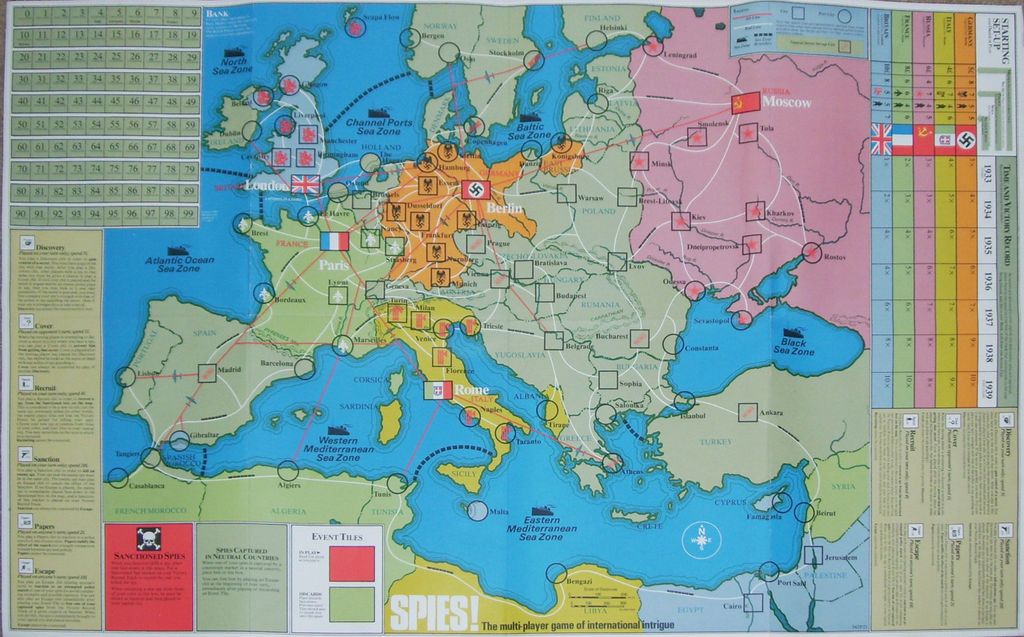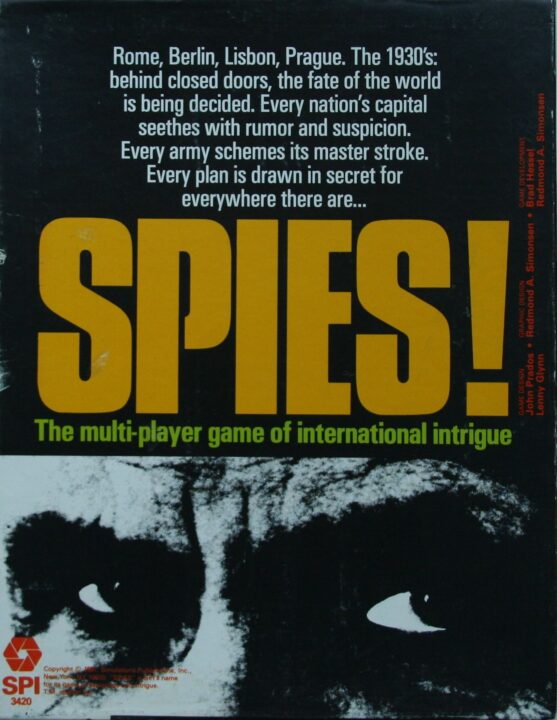If you’re after a board game that makes you question your friends’ trustworthiness and maybe your own, you’re in the right spot. This review covers my ragtag group’s wild ride through espionage, bluffing, debates, and more shouting than the last time we tried to order pizza together. I’ll tell you what works, what doesn’t, and why spies! might just be the game that saves—or ruins—your next game night. Spoiler: sharp glasses and trenchcoats not required, but I tried both anyway.
How It Plays
Setting Up
First, everyone picks a secret spy identity. Shuffle the cards, hand them out, and place the board in the middle. Everyone grabs their colored tokens and mission sheets. Don’t forget to hide your secret plans from those sneaky friends who can’t help but peek!
Gameplay
On your turn, you move your spy around the board, complete missions, and collect clues. You never know who to trust, because anyone can lie straight to your face. Try to outsmart opponents by bluffing and trading fake info. Watch for players who get too quiet—that’s how my cousin Becky won last time, and we still haven’t forgiven her.
Winning the Game
You win if you complete all your secret missions before anyone else does. Trust me, it feels good to stand up and shout “I win!” while everyone else groans. But watch out for sudden betrayals and last-minute twists—they can turn the whole game upside down.
Want to know more? Read our extensive strategy guide for Spies!.
Game Balance and Fairness in Spies!
Game balance should be the backbone of any board game, like the solid waistband on those pants you bought online. It stops everything from falling down around you. In ‘spies!’, balance gets tested harder than my resolve at a buy-one-get-one-free donut sale. The good news? The game does a decent job of keeping things even. Every player is a secret agent, and nobody gets saddled with a job that’s so easy or hard it ruins everyone’s fun. You can win using brains, not just lucky dice throws. That’s a big plus for anyone who’s fallen victim to Lady Luck’s cruel sense of humor in other games.
However, things aren’t perfect. In my group, we noticed that if you’re caught out early, you can fall behind tough and fast. Sometimes, you can get stuck in a corner doing your best James Bond but still feel like you’re running in circles. If you get off to a slow start, you might spend the rest of the game playing catch up. There’s a bit of a snowball effect here. You mess up small, and suddenly everyone suspects you, and it’s not easy to shake that off. I’ve seen friendships tested harder than my patience during a family Monopoly game.
For balance and fairness, I have to say ‘spies!’ does above average, but there’s room to improve. Please, no one wants to flip the table. Now, let’s crack open the dossier on the juiciest part—player interaction and social deduction. Get your poker face ready!

Player Interaction and Social Deduction in Spies!
Let’s talk about the glorious chaos that is player interaction in spies!. If you think you can win this game by sitting quietly, sipping tea, and waiting for everyone else to make mistakes, you’re in for a rude awakening. In our group, the real game didn’t even start until someone accused someone else of being a double agent. Suddenly, everyone was side-eyeing each other and trust flew out the window faster than my dignity during charades night.
At its core, spies! is a test in reading people. These interactions feel tense and real, which is perfect for those who love a little drama (and who doesn’t enjoy drama when it’s not about family dinners?). I couldn’t help but notice that my friend Greg, the worst liar in the group, got voted out first—every time. You have to talk, bluff, and sometimes convince your childhood friend that you’re not sabotaging them. Good luck with that.
The social deduction aspect can get wild. You’ll throw around wild accusations, try to spot tells, and sometimes overthink a simple twitch into an international conspiracy. It’s part psychology, part performance, and 100% entertainment. The best bit? The game gives everyone a role to play, so nobody gets left out in the cold. I love how active everyone stays the whole time—unlike some games where people mentally check out after they lose.
If you love games where you have to outwit, outplay, and out-guess your friends, spies! delivers. But will you want to replay it every week, or does it run out of steam faster than an undercooked soufflé? Stick around for the next section, where we’ll sneak into the thrilling world of replay value and strategy depth!
Replay Value and Strategy Depth in Spies!
Okay, let’s talk about replay value and strategy depth, two things that keep me coming back to a board game like a squirrel after fresh acorns. Spies! holds up better than my coffee mug after a good tumble—there’s always something new each time my friends and I play. The missions and shifting alliances make every game feel a bit different. Not a single game night has played out the same, much to my relief (and disappointment, since I still haven’t won as many times as I brag I have).
I’ll admit, Spies! is not a brain-burner. You’re not going to need a spreadsheet to win this one. But, if you’re the kind who loves reading people, trying sneaky moves, and bluffing your heart out, you’ll get a lot out of it. There’s always that one friend who manages to play both sides, and I salute him while plotting his board game doom. There’s just enough room for clever plays to make you feel smart when things go your way, but not so much complexity that you’re left with a headache.
The randomness of the missions and roles keeps things fresh, but it never feels like pure luck (thank goodness, or you’d see me flip the table). Spies! somehow keeps that balance between skill and suspense, which is why my group keeps reaching for it when we want a game night full of laughs and backstabbing (the fun kind).
Now, if you want to know if the cards and tokens in Spies! are as cool as the theme, grab your spy glasses, because next up we’ll sneak into Theme and Component Quality!
Theme and Component Quality in Spies!
One thing that grabbed me right away about spies! is the theme. Everyone wants to be a spy at least once. After all, who wouldn’t want an excuse to wear sunglasses indoors and speak in a fake accent? The game leans hard into the classic spy vibe with secret missions, coded messages, and a good chunk of suspicion tossed around like confetti. Each play feels like you just walked onto a movie set from the 60s. If you don’t accidentally call someone ‘Agent 47’ at least once, you’re doing it wrong.
Let’s talk parts and pieces. The box comes packed with thick cards that feel like they’ll survive a few snack spills (I learned this the hard way – salsa isn’t permanent, apparently). The artwork has a charming retro flair, making even the rules sheet look like something from a Cold War drama. Tokens and board sections are sturdy, and nothing is so small that the dog can eat it (unless you actually have a very determined dog).
But hey, the insert could be better. Everything rattles around a bit, and if you’re one of those people who carries games to every family event, expect to do some sorting.
So, do I recommend spies!? If you enjoy pretending you’re way sneakier than you really are and like that classic spy feel—absolutely! Just keep an eye on your snacks and your dog.
Conclusion
And there you have it—my review of spies! wraps up here. After many sneaky games, way too much finger pointing, and a fair share of bluffing disasters, I can say this game brings loads of laughs and tense moments. The theme pops, player interaction stays high, and every session feels a bit different (mostly because Steve always accuses the wrong person). The strategy isn’t super deep, and luck still crashes the party on occasion, but for a fast-paced social game, it works pretty well. If you love bluffing and messing with your mates (and who doesn’t?), spies! is worth a go. Just don’t trust anyone, even if they bring snacks. That’s my final verdict—over and out!


